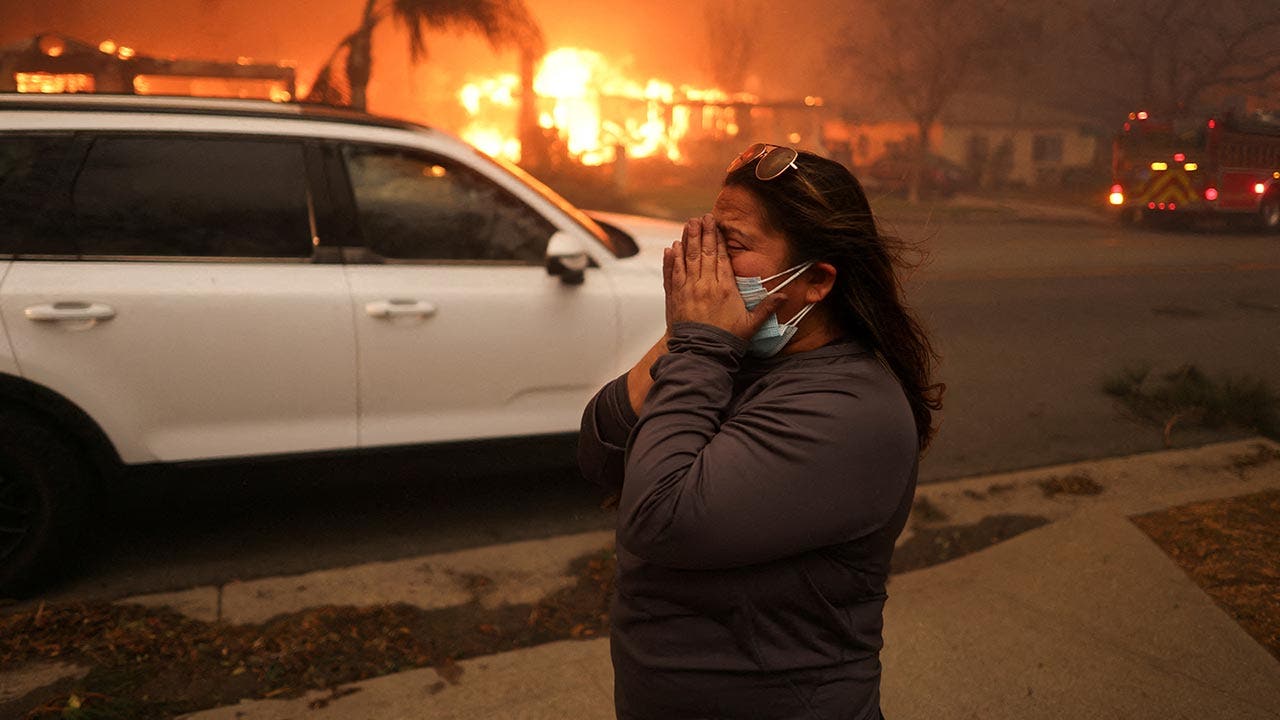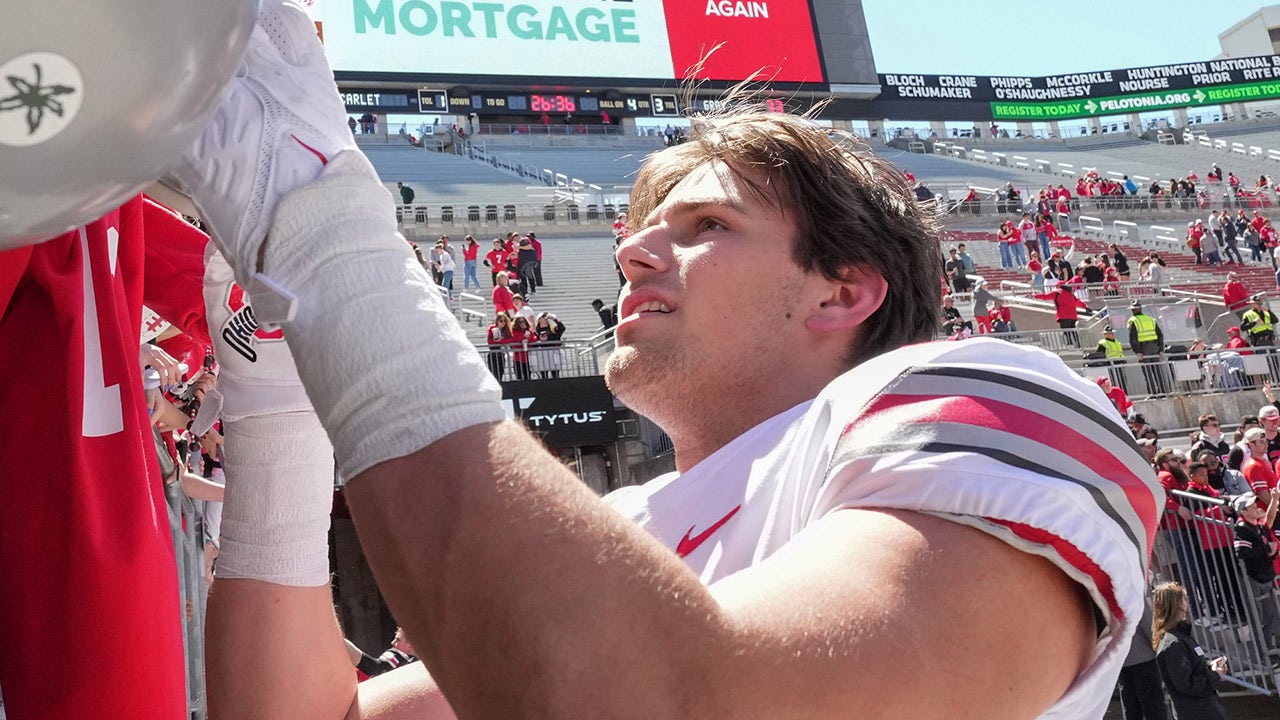North Dakota
During Grand Forks visit, Transportation Secretary Pete Buttigieg touts benefits of planned rail underpass

GRAND FORKS — U.S. Secretary of Transportation Pete Buttigieg on Monday touted the benefits of a $30 million grant designed to improve safety and efficiency at one of the state’s most troublesome rail crossings.
Eric Hylden/Grand Forks Herald
The project will construct a vehicle underpass at the intersection of 42nd Street and DeMers Avenue in Grand Forks, allowing unimpeded north-south travel for vehicle traffic. The underpass also will include a 10-foot-wide path for pedestrians and cyclists.
The grant is one of 63 awarded nationwide, totaling more than $570 million within the U.S. Department of Transportation’s (USDOT) railroad crossing elimination program, which has worked to improve safety at more than 400 railway crossings. It is part of the $1 trillion Infrastructure Investment and Jobs Act, signed into law in November 2021 by the Biden administration.
Buttigieg made the announcement at a ceremony Monday in Grand Forks. During the event, he said he admires Grand Forks’ dedication to improving its future, and cited the project as evidence.
“I’m really happy to be here and have the chance to see this community, and the pride people take in it,” he said. “I’ll be honest: The first time I ever heard of Grand Forks was when you had those terrible floods in the 1990s. The whole nation paused to see how you would recover, lift each other up and build a better future. Now, you’re living in that future that you helped each other toward, and we’re trying to make that future even brighter.”
Mayor Brandon Bochenski thanked local, state and federal leaders for their work in securing the grant.
“I would like to thank our federal delegation for raising awareness of this project at a national level and for continuing to champion Grand Forks,” Bochenski said. “This is the largest federal grant for a road project in Grand Forks’ history. I would also like to thank our city engineering staff for their relentless work along with the North Dakota Department of Transportation and (rail company) BNSF to try to find a funding solution for this project.”
Gary Lorenz, fire chief of the Grand Forks Fire Department, said the underpass will “significantly improve public safety within the city.” He cited the elimination of potential vehicle-train collisions at the intersection, along with unimpeded travel for emergency responders to the northwest section of the city.

Eric Hylden/Grand Forks Herald
“Emergencies will and do occur at any time of the day or night,” Lorenz said. “If first responders must take alternative routes, or dispatch different units because trains are occupying this intersection, precious lifesaving minutes are lost.”
According to Buttigieg, the intersection has experienced 69 crashes causing 12 injuries over the past five years, including a vehicle-train collision, and has been “the railroad crossing with the most complaints in North Dakota.”
“The mayor let me know that the 42nd Street rail crossing is something the community here has been working on addressing since 1991,” Buttigieg said. “And with good reason. The university has made clear its concerns about the lack of safe crossing for students walking or biking around here. This crossing right here has received more complaints than any other in the state of North Dakota.”
Buttigieg also said the underpass will be a boon for commerce by reducing shipping delays.
“You don’t have to live anywhere near North Dakota to feel the impact any time things are not as fluid as they ought to be on the highways or rail lines that come through this state,” he said.
U.S. Sen. Kevin Cramer — a ranking member on the Senate Subcommittee on Transportation and Infrastructure — said he is impressed with the level of bipartisanship on the subject of infrastructure.
“Working on that bill was one of the joys of my career so far in Congress,” said Cramer, R-N.D. “We passed two bills in our committee unanimously. You know how hard it is to do things unanimously in Washington? Well, it’s not that hard when you do the right thing, and you’re talking about one thing everyone agrees on. And that’s that infrastructure is critical to our safety, security and the efficient movement of goods and services.”
Buttigieg also praised the spirit of bipartisanship that helped the grant’s funding source come to fruition.
“As Senator Cramer said, you usually find people having trouble believing that you can get anything done on a bipartisan basis in today’s Washington,” he said. “Here you have this bipartisan infrastructure law that has helped to make possible grants across the country and North Dakota. I think there’s something poetic about the fact that Republicans and Democrats crossed the aisle to work together so that pedestrians and vehicles will be able to cross this intersection safely.”
Banish covers news pertaining to K-12 and higher education, as well as county commission coverage.

North Dakota
School phone policies needed, but not a state ban, bill opponents say

Mactrunk / Depositphotos.com
BISMARCK (North Dakota Monitor) – North Dakota public education groups said Wednesday they recognize the need for a policy on student use of cellphones but mostly resisted a call for a state-mandated ban.
Rep. Jim Jonas, R-West Fargo, introduced House Bill 1160 that would ban students from using cellphones during class time.
A proposed amendment to the bill would add some exemptions, like using a smartphone to monitor health conditions, such as diabetes, and in some cases where students are on a learning plan crafted for the student.
The House Education Committee did not act on the bill or the amendment but indicated that there would be more discussion next week.
KrisAnn Norby-Jahner, legal counsel for the North Dakota School Boards Association, testified that the cellphone use issue should be handled at the local level, but added she would not be opposed to a bill requiring that school districts have a cellphone policy.
Mike Heilman, executive director of the North Dakota Small Organized Schools, testified that the group’s board members did not support the bill.
He said some teachers have students use their phone during class and designate a spot on the desk where the phone should be when not being used.
He also said some schools may want to make exceptions for juniors and seniors to have more access to their phones
But he also said schools might like the state’s support on the need for a cellphone policy.
Cellphone use among students was described during testimony as a mental health issue in addition to being a distraction.
Rachel Bachmeier, principal at West Fargo High School, said there has been “less drama” since the school restricted phone use to breaks between classes.
She said parents generally support that policy, with little support for an overall ban during the school day.
Steve Madler, principal at Bismarck Century High School, said his experience with a ban during the school day turned out to be unworkable for many students and parents.
The U.S. Department of Education in December called on every state and school district to adopt a policy on phone use in schools.
Jonas, a former West Fargo teacher, said the goal of the bill is improved test scores and mental health. He said he received some calls from principals for an all-out ban during the school day.
When asked what the penalty would be for a school that did not enforce the state policy, he did not give specifics.
“The hope is that they would abide by the law,” he said.
North Dakota
Two Grand Forks residents among finalists for state Board of Higher Education

GRAND FORKS — Two Grand Forks residents are among six finalists to fill two seats on the state Board of Higher Education, State School Superintendent Kirsten Baesler announced this week.
A nominating committee selected the six finalists, and the names will next go before Gov. Kelly Armstrong to make the final two appointments, which then must be confirmed by the North Dakota Senate.
The selected nominees will fill the board seats currently held by Casey Ryan, a Grand Forks physician who is finishing his second four-year term on the board and is not eligible for reappointment, and Jeffry Volk, a retired Fargo consulting engineer, who is eligible for a second term.
The finalists for Ryan’s seat are:
- Levi Bachmeier, business manager of the West Fargo school district and education adviser to former Gov. Doug Burgum,
- Russel Crary, a Grand Forks real estate developer, and
- Rich Wardner, of Dickinson, a former North Dakota Senate majority leader and retired K-12 teacher and coach.
The finalists for Volk’s seat are:
- Beverly Johnson, of Grand Forks, a retired physical therapy professor and clinical education director at the UND medical school,
- Warren Sogard, owner and chairman of American State Bank and Trust Co., of Williston, and
- Volk, the incumbent.
The nominating committee met Tuesday to review a dozen applicants for the two openings, according to a release. Baesler is chairwoman of the nominating committee, and other members are Jon Jensen, chief justice of the North Dakota Supreme Court; Nick Archuleta, president of North Dakota United, which represents teachers and state employees; House Speaker Robin Weisz, R-Hurdsfield; and Senate President Pro Tempore Brad Bekkedahl, R-Williston, the release said.
The Board of Higher Education has eight voting members and two nonvoting members who represent the system’s faculty and staff. It oversees the North Dakota University System’s 11 colleges and universities.
Our newsroom occasionally reports stories under a byline of “staff.” Often, the “staff” byline is used when rewriting basic news briefs that originate from official sources, such as a city press release about a road closure, and which require little or no reporting. At times, this byline is used when a news story includes numerous authors or when the story is formed by aggregating previously reported news from various sources. If outside sources are used, it is noted within the story.
North Dakota
North Dakota family leads fight against youth suicide

Editor’s note: If you or someone you know is in crisis, please call the National Suicide Prevention Lifeline at 988 or contact the Crisis Text Line by texting TALK to 741741.
FARGO — Suicide is the leading cause of death for young people in North Dakota aged 10 to 24, a sobering statistic The 463 Foundation is determined to change.
The foundation, created by Todd and Elizabeth Medd after losing their son Liam to suicide in 2021, hosted a suicide prevention night at Discovery Middle School on Tuesday, Jan. 14. The event emphasized the importance of mental health awareness and reducing stigma.
“Our goal is to make sure that one person hears the right message or the message at the right time,” said Todd Medd, co-founder of the foundation. “With that message, they can either use it for themselves or share it with others as well.”
The Medd family spoke to students and parents about warning signs such as self-segregation or sudden behavioral changes and highlighted studies showing teen suicides can often be impulsive, with 25% of cases occurring within five minutes of the first thought.
Todd Medd emphasized the power of open dialogue. “Vulnerability breeds vulnerability,” he said. “When you share your challenges, it opens the door for deeper conversations with your kids.”
The 463 Foundation will continue its efforts to spread hope and awareness, including its fourth annual baseball tournament in June to support Fargo youth baseball and promote its mission.
-
/cdn.vox-cdn.com/uploads/chorus_asset/file/25822586/STK169_ZUCKERBERG_MAGA_STKS491_CVIRGINIA_A.jpg)
/cdn.vox-cdn.com/uploads/chorus_asset/file/25822586/STK169_ZUCKERBERG_MAGA_STKS491_CVIRGINIA_A.jpg) Technology7 days ago
Technology7 days agoMeta is highlighting a splintering global approach to online speech
-

 Science4 days ago
Science4 days agoMetro will offer free rides in L.A. through Sunday due to fires
-
/cdn.vox-cdn.com/uploads/chorus_asset/file/25821992/videoframe_720397.png)
/cdn.vox-cdn.com/uploads/chorus_asset/file/25821992/videoframe_720397.png) Technology1 week ago
Technology1 week agoLas Vegas police release ChatGPT logs from the suspect in the Cybertruck explosion
-

 Movie Reviews1 week ago
Movie Reviews1 week ago‘How to Make Millions Before Grandma Dies’ Review: Thai Oscar Entry Is a Disarmingly Sentimental Tear-Jerker
-

 Health1 week ago
Health1 week agoMichael J. Fox honored with Presidential Medal of Freedom for Parkinson’s research efforts
-

 Movie Reviews1 week ago
Movie Reviews1 week agoMovie Review: Millennials try to buy-in or opt-out of the “American Meltdown”
-

 News1 week ago
News1 week agoPhotos: Pacific Palisades Wildfire Engulfs Homes in an L.A. Neighborhood
-

 World1 week ago
World1 week agoTrial Starts for Nicolas Sarkozy in Libya Election Case







/cdn.vox-cdn.com/uploads/chorus_asset/file/25833258/Screenshot_2025_01_15_at_8.11.01_PM.png)












